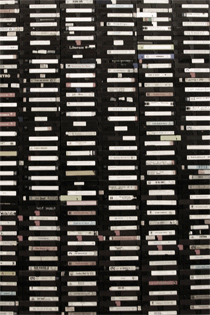Les nourritures terrestres de l’Expo 2015 à Milan.
Jacques Lévy | 13.07.2015
The topic of Milan’s World Expo 2015, “Feed the Planet” appears simultaneously mediocre, disputable, and complacent. Beyond this mixture of commerce, ecology and geopolitics, couldn’t we find there an indication that the very raison d’être of this kind of event has been exhausted? In the current context, Expos are not necessary, and even not useful anymore to discover the World, and lazy travellers only seem to keep good reasons to go there. However, this “floppy zone of the middle [...]
Boris Beaude | 07.07.2015
L’absence de clarté en sciences sociales sur un ensemble de problématiques fondamentales pose problème. Qu’est-ce qu’une science qui n’a pas vocation à expliquer, qui n’est pas vraiment expérimentale, dont les énoncés ne peuvent pas être sérieusement réfutés ou comparés, dont les expériences ne sont pas réellement reproductibles, qui est exceptionnellement cumulative, qui ne peut concevoir des lois ? Et qui, finalement, si elle existait, assimilerait les sujets à des objets, c’est-à-dire à des réalités comparables dont l’action est [...]
Chronique d’une enquête.
Marie-Thérèse Têtu | 02.07.2015
In 2009, Lyon’s prisons closed. The Montluc prison was the only one that was saved from demolition and turned into a memorial to the victims of the Nazi repression. By so doing, the other stories and memories of this prison, that operated from 1921 to 2009, were « forgotten », including those of the Algerian War. This article retraces the investigation that was conducted by sociologists who followed « the making of » of this heritage process and sought [...]
Luca Pattaroni | 23.06.2015
With this glossary, written in the framework of an exploratory research on the relation to the future, we attempt to draw the conceptual network that allows for a “pratical understanding” of the future (Ricoeur 1983). A conceptual network that enables to answer the “what”, “who”, “why” and “how” of human actions. This glossary evolves around two axes : on the one hand, the way people are cognitively able to conceive of a future and, on the other hand, the [...]
La co-construction sociale du temps et de l’espace dans la nouvelle étape de mondialisation.
Géraldine Djament-Tran | 15.06.2015
This article analyzes a contemporary change in the spatial dimension of heritage, characterized by a twofold process of territorialization and deterritorialization. It shows that the territorialization of heritage has changed in scale and in social function — from the heritage of quarters, not just buildings, it has come to signify the multiplication of heritage-based public perimeters and even the contribution of heritage to processes of territorialization —, that it forms a system with networking and standardization of heritage, and [...]
Jablonka, Ivan. 2014. L’Histoire est une littérature contemporaine. Manifeste pour les sciences sociales. Paris : Seuil.
Olivier Lazzarotti | 15.06.2015
From reading the book of Ivan Jablonka (2014), L’Histoire est une literature contemporaine, this text emphasizes the idea that the scientific work of writing is one of the components of scientific production. [...]
Ethnographie des écrits de travail d’un conteur contemporain.
Anne-Sophie Haeringer | 09.06.2015
This article reopens the question of the art of memory by putting it to the test of the current revival of an old practice : the oral transmission of the tale. One of the difficulties met by current storytellers is the mandatory step of the written text. This paper focuses on the writings of a storyteller : annotations in the margins of collected tales, texts rewrites, filings in computer folders. Following a resolutely pragmatic anthropology of writing, I show [...]
Dominique Belkis et Michel Peroni | 09.06.2015
This article discusses the film Les hommes debout, which focuses on a neighborhood of Lyon that is under renovation (Gerland) and the memory associated with it. However, the authors are less concerned with considering it as a document subject to sociological analysis than by recognizing it as part of an investigation that is already fully underway, the one conducted by the director in an aesthetic format. Adopting a pragmatic standpoint, they suggest following suit to the filmmaker, as it [...]
Membrado, Monique et Alice Rouyer (dirs.). 2013. Habiter et vieillir, vers de nouvelles demeures. Toulouse : Éditions ERES.
Yannick Orain | 02.06.2015
Aging is a natural process. Yet, we often associate it with a final stage and therefore focus on the problems of advanced age. Becoming old is thus nothing else than getting closer to death ; it consists in the rupture of our linear conception of life. The authors of Habiter et vieillir inquire into these ruptures, which allow us to identify the moments in which we are faced with the reality of old age. Through different angles, Monique Membrado [...]
Dosse, François. 2014. Castoriadis, une vie. Paris : La Découverte.
Christophe Premat | 26.05.2015
François Dosse’s biography of Cornelius Castoriadis proceeds from in-depth work on the archives of Castoriadis, which helps the reader grasp the framework of the philosopher’s conceptual production. The group and journal Socialisme ou Barbarie were essential in the development of an original philosophy, whose influence was unfortunately minor on the intellectual climate in France at the end of the sixties. The rediscovering of Castoriadis is the occasion to analyze the situation of a marginalized intellectual generation in France. The [...]

